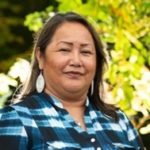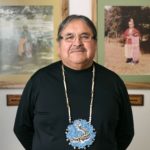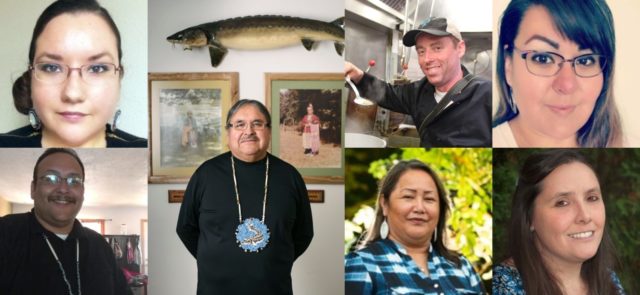This is the second of a five-part series. Part 1 is here.
 Nathan Gordon is president of the board of Native American Tourism of Wisconsin, an organization that aims to promote tribal tourism and economic development, while highlighting the beauty, diversity and cultural dynamism of the 11 federally recognized tribes of Wisconsin. NATOW is composed of representatives from each tribe who meet bi-monthly to discuss and implement its strategic initiatives. As one of the largest tribal tourism organizations in the country, NATOW has grown to be a recognized force in Wisconsin at gatherings, festivals, and events. Gordon is also vice chair of the Red Cliff Band of Ojibwe.
Nathan Gordon is president of the board of Native American Tourism of Wisconsin, an organization that aims to promote tribal tourism and economic development, while highlighting the beauty, diversity and cultural dynamism of the 11 federally recognized tribes of Wisconsin. NATOW is composed of representatives from each tribe who meet bi-monthly to discuss and implement its strategic initiatives. As one of the largest tribal tourism organizations in the country, NATOW has grown to be a recognized force in Wisconsin at gatherings, festivals, and events. Gordon is also vice chair of the Red Cliff Band of Ojibwe.
 Monique Tyndall is Director of Cultural Affairs for the Stockbridge-Munsee Band of Mohicans. Cultural Affairs is a newly established department that has consolidated the Library/Museum, Historic Preservation, and Language programs. Since 2005 she has served in various cultural heritage roles within her tribe. Including, establishing collections management practices for the Library/ Museum, assisting with NAGPRA claims, language and cultural education. Monique was recently awarded the Fellowship in Native American Collections Care at the Midwest Arts Conservation Center (2021). She holds a M.A. in Cultural Sustainability at Goucher College (2017). Recipient of the 2018 Rory Turner Prize for best capstone in Cultural Sustainability (2017). She holds a B.A. in Museum Studies from the Institute of American Indian Arts (2007). She has over 15 years of experience in cultural preservation through positions, internships, and fellowships at the Menominee Tribal Archives, College of Menominee Nation Verna Fowler Library Special Collections, Stockbridge-Munsee Community, Museum of Contemporary Native Arts, National Park Service, Smithsonian-National Museum of the American Indian, Midwest Art Conservation Center. Monique has received special acknowledgements in the book, Images of America: Langlade County (Arcadia Publishing, 2012). She has provided 10 years of cultural education for Bowman Performance Consulting in areas of programming, research, and evaluation with scientific rigor and cultural responsiveness. She contributed to the book, continuing the Journey to Reposition Culture & Cultural Context in Evaluation Theory & Practice (Information Age Publishing, 2015) regarding multi-jurisdictional Indigenous evaluation.
Monique Tyndall is Director of Cultural Affairs for the Stockbridge-Munsee Band of Mohicans. Cultural Affairs is a newly established department that has consolidated the Library/Museum, Historic Preservation, and Language programs. Since 2005 she has served in various cultural heritage roles within her tribe. Including, establishing collections management practices for the Library/ Museum, assisting with NAGPRA claims, language and cultural education. Monique was recently awarded the Fellowship in Native American Collections Care at the Midwest Arts Conservation Center (2021). She holds a M.A. in Cultural Sustainability at Goucher College (2017). Recipient of the 2018 Rory Turner Prize for best capstone in Cultural Sustainability (2017). She holds a B.A. in Museum Studies from the Institute of American Indian Arts (2007). She has over 15 years of experience in cultural preservation through positions, internships, and fellowships at the Menominee Tribal Archives, College of Menominee Nation Verna Fowler Library Special Collections, Stockbridge-Munsee Community, Museum of Contemporary Native Arts, National Park Service, Smithsonian-National Museum of the American Indian, Midwest Art Conservation Center. Monique has received special acknowledgements in the book, Images of America: Langlade County (Arcadia Publishing, 2012). She has provided 10 years of cultural education for Bowman Performance Consulting in areas of programming, research, and evaluation with scientific rigor and cultural responsiveness. She contributed to the book, continuing the Journey to Reposition Culture & Cultural Context in Evaluation Theory & Practice (Information Age Publishing, 2015) regarding multi-jurisdictional Indigenous evaluation.
 Dr. Heather Ann Moody is an associate professor of American Indian Studies at UW-Eau Claire, where she’s taught for nearly 15 years. She serves as the state chair of the American Indian Program Curriculum, the body that oversees implementation of Wisconsin Educational Act 31, which outlines American Indian requirements for curricula in K-12 and higher education. At UW-Eau Claire she teaches courses in American Indian history and culture with an emphasis on Wisconsin and Minnesota tribal nations, American Indian literature and film, and indigenous methods and research. She was recognized as a 2019 Outstanding Woman of Color in Education by UW System. She earned a bachelor’s degree in American Indian Studies from UW-Eau Claire, master’s degree from the University of Arizona and doctoral degree from in teaching and learning from University of Minnesota-Duluth. She also holds a certificate in museum studies and anthropology from UW-Milwaukee.
Dr. Heather Ann Moody is an associate professor of American Indian Studies at UW-Eau Claire, where she’s taught for nearly 15 years. She serves as the state chair of the American Indian Program Curriculum, the body that oversees implementation of Wisconsin Educational Act 31, which outlines American Indian requirements for curricula in K-12 and higher education. At UW-Eau Claire she teaches courses in American Indian history and culture with an emphasis on Wisconsin and Minnesota tribal nations, American Indian literature and film, and indigenous methods and research. She was recognized as a 2019 Outstanding Woman of Color in Education by UW System. She earned a bachelor’s degree in American Indian Studies from UW-Eau Claire, master’s degree from the University of Arizona and doctoral degree from in teaching and learning from University of Minnesota-Duluth. She also holds a certificate in museum studies and anthropology from UW-Milwaukee.
 Melinda Young is health and wellness coordinator at Gookomis Endaad, the community based residential facility for the Lac du Flambeau Band of Lake Superior Chippewa, where she was interim director for five months last year. She took on this role after more than 20 years working in a variety of positions within the Lac du Flambeau government, mostly as the Tribal Historic Preservation Officer. She’s served on a number of tribal committees over the years and holds two governor appointed positions, on the Wisconsin Historic Preservation Review Board and Wisconsin Burial Sites Preservation Board. She earned a bachelor’s degree in American Indian Studies from UW-Eau Claire and master’s in Tribal Administration and Governance from UM-Duluth.
Melinda Young is health and wellness coordinator at Gookomis Endaad, the community based residential facility for the Lac du Flambeau Band of Lake Superior Chippewa, where she was interim director for five months last year. She took on this role after more than 20 years working in a variety of positions within the Lac du Flambeau government, mostly as the Tribal Historic Preservation Officer. She’s served on a number of tribal committees over the years and holds two governor appointed positions, on the Wisconsin Historic Preservation Review Board and Wisconsin Burial Sites Preservation Board. She earned a bachelor’s degree in American Indian Studies from UW-Eau Claire and master’s in Tribal Administration and Governance from UM-Duluth.
 Dan Cornelius is a member of the Oneida Nation of Wisconsin and Outreach Specialist and Deputy Director of the Great Lakes Indigenous Law Center in the UW Law School. He is a 2009 alumnus of the Wisconsin Law School. For seven years Dan worked for the Intertribal Agriculture Council in partnership with the US Department of Agriculture. Dan’s work has focused on assisting Native Nations and their members with development of Native agriculture and food systems, promoting improved access to USDA programs, including conservation, value-added production, and infrastructure development, as well as expanding intertribal trade and commerce.
Dan Cornelius is a member of the Oneida Nation of Wisconsin and Outreach Specialist and Deputy Director of the Great Lakes Indigenous Law Center in the UW Law School. He is a 2009 alumnus of the Wisconsin Law School. For seven years Dan worked for the Intertribal Agriculture Council in partnership with the US Department of Agriculture. Dan’s work has focused on assisting Native Nations and their members with development of Native agriculture and food systems, promoting improved access to USDA programs, including conservation, value-added production, and infrastructure development, as well as expanding intertribal trade and commerce.
 Edith Leoso the Tribal Historic Preservation Officer for the Bad River Band of Lake Superior Tribe of Chippewa in northern Wisconsin, and previously served two terms on the Bad River Tribal Council. She is known nationally as a resource on tribal historic preservation, appearing in video documentaries and news shows including on NPR’s All Things Considered.
Edith Leoso the Tribal Historic Preservation Officer for the Bad River Band of Lake Superior Tribe of Chippewa in northern Wisconsin, and previously served two terms on the Bad River Tribal Council. She is known nationally as a resource on tribal historic preservation, appearing in video documentaries and news shows including on NPR’s All Things Considered.
 David Grignon is Tribal Historic Preservation Officer for the Menominee Indian Tribe, and the Tribe’s Native American Grave Protection and Repatriation Act designate. Grignon’s knowledge of the nation’s history, geography and traditions has proved valuable in the effort to stop a massive open-pit mine from being dug along the banks of the Menominee River.
David Grignon is Tribal Historic Preservation Officer for the Menominee Indian Tribe, and the Tribe’s Native American Grave Protection and Repatriation Act designate. Grignon’s knowledge of the nation’s history, geography and traditions has proved valuable in the effort to stop a massive open-pit mine from being dug along the banks of the Menominee River.
Part 3 coming tomorrow!


































